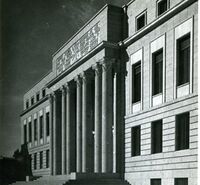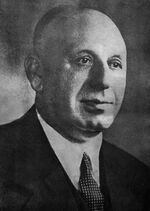Segurança
| Força Segurança da Reino Unido | |
 Office of the Segurança, Precea | |
| Agency overview | |
|---|---|
| Formed | 1925 |
| Dissolved | 1934 |
| Headquarters | Precea |
| Minister responsible |
|
| Agency executives |
|
The Security Force of the United Kingdom (Luzelese: Força Segurança da Reino Unido), more commonly called the Segurança, was the official secret police of the government of Functionalist Paretia and the 7th of November Movement Used in the repression of the people during the time, they became known for usage of kidnapping, assassination, and torture on suspects.
History
Creation
The organization was formed in 1926 as part of a reorganization of it's predecessor, the National Special Police Unit, the new agency would be given much more strength and power. The organization was made up of fanatic supporters of the ruling New Nation of Paretia Party and Carlos Palmeira, it's first leader was Valentí Maynou, former National Special Police Chief of Tosutonia and devout functionalist, he would begin targeting those considered enemies of the regime. He would create a list of targets, that he called "The list of the degenerates, the germs, and the enemies."
Actions
Some of the first actions taken by the Segurança was the public hangings and targeting of leftists and liberals. Palmeira ordered an attack in June of 1926 that became known as by the government as the "Operação Especial Antiinimigo", which targeted political opposition that remained in the country, including members of the PNNP that were considered a threat to the regime.
In November of 1926 the government would enact a policy known as the "Movimento Antidegenerado" which targeted artworks, literature, and architecture, and would see the arrests of artists, authors, and architects that were considered "degenerate", many pieces of property were confiscated by the government and burned in public PNNP rallies. Many of the artists and others were imprisoned, and some executed by the government.

